Related Research Articles
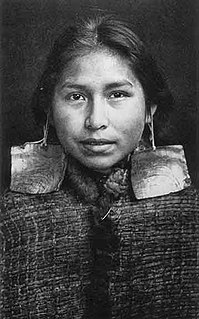
In the Land of the Head Hunters is a 1914 silent film fictionalizing the world of the Kwakwaka'wakw peoples of the Queen Charlotte Strait region of the Central Coast of British Columbia, Canada, written and directed by Edward S. Curtis and acted entirely by Kwakwaka'wakw native people.
This article is about the spiritual beliefs, histories and practices in Kwakwaka'wakw mythology. The Kwakwaka'wakw are a group of Indigenous nations, numbering about 5,500, who live in the central coast of British Columbia on northern Vancouver Island and the mainland. Kwakwaka'wakw translates into "Kwak'wala speaking tribes." However, the tribes are single autonomous nations and do not view themselves collectively as one group.

A potlatch is a gift-giving feast practiced by Indigenous Peoples of the Pacific Northwest Coast of Canada and the United States, among whom it is traditionally the primary governmental institution, legislative body, and economic system. This includes the Heiltsuk, Haida, Nuxalk, Tlingit, Makah, Tsimshian, Nuu-chah-nulth, Kwakwaka'wakw, and Coast Salish cultures. Potlatches are also a common feature of the peoples of the Interior and of the Subarctic adjoining the Northwest Coast, although mostly without the elaborate ritual and gift-giving economy of the coastal peoples.

The Kwakwa̱ka̱ʼwakw, also known as the Kwakiutl are Indigenous peoples of the Pacific Northwest Coast. Their current population, according to a 2016 census, is 3,665. Most live in their traditional territory on northern Vancouver Island, nearby smaller islands including the Discovery Islands, and the adjacent British Columbia mainland. Some also live outside their homelands in urban areas such as Victoria and Vancouver. They are politically organized into 13 band governments.

Wakashan is a family of languages spoken in British Columbia around and on Vancouver Island, and in the northwestern corner of the Olympic Peninsula of Washington state, on the south side of the Strait of Juan de Fuca.
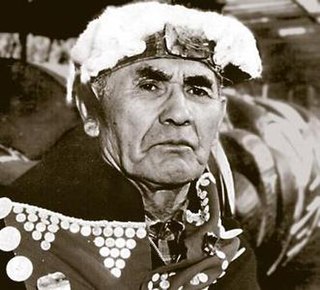
Chief Mungo Martin or Nakapenkem, Datsa, was an important figure in Northwest Coast style art, specifically that of the Kwakwaka'wakw Aboriginal people who live in the area of British Columbia and Vancouver Island. He was a major contributor to Kwakwaka'wakw art, especially in the realm of wood sculpture and painting. He was also known as a singer and songwriter.

Dzunuḵ̓wa, also Tsonoqua, Tsonokwa, Basket Ogress, is a figure in Kwakwaka'wakw mythology and Nuu-chah-nulth mythology.
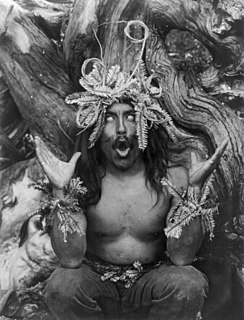
Hamatsa is the name of a Kwakwaka'wakw secret society. During the winter months, the Kwakwaka'wakw of British Columbia has many ceremonies practiced by different secret societies. According to the German-American anthropologist Franz Boas, who studied the Kwakwaka'wakw tribe during the late 1880s, there were four main societies: The war society (Winalagalis), the magical society (Matem), the society of the afterlife (Bakwas) and the "cannibal" society (Hamatsa).
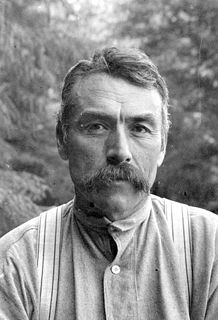
George Hunt (Tlingit) was a consultant to the American anthropologist Franz Boas; through his contributions he is considered a linguist and ethnologist in his own right. He was Tlingit-English by birth and learned both those languages. Growing up with his parents at Fort Rupert, British Columbia in Kwakwaka'wakw territory, he learned their language and culture as well. Through marriage and adoption he became an expert on the traditions of the Kwakwaka'wakw of coastal British Columbia.
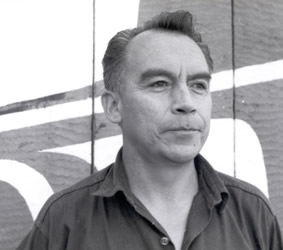
Henry Hunt was a First Nations woodcarver and artist from the Kwakwaka'wakw people of coastal British Columbia.

Fort Rupert is the site of a former Hudson's Bay Company fort which was built and first commanded by William Henry McNeill in 1849 and later by John Work. It is located near present-day Port Hardy, British Columbia on Vancouver Island.
The Tribal Eye is a seven-part BBC documentary series on the subject of tribal art, written and presented by David Attenborough. It was first transmitted in 1975.
Willie Seaweed (1873–1967) was a Kwakwaka'wakw chief and wood carver from Canada. He was considered a master Northwest Coast Indian artist who is remembered for his technical artistic style and protection of traditional native ceremonies during the Canadian potlatch ceremony ban. Today, Seaweed's work can be found in cultural centers and corporations, art museums, natural history museums, and private collections. Some pieces are still in use by the Nak'waxda'xw tribe.

A transformation mask, also known as an opening mask, is a type of mask used by indigenous people of the Northwest Coast and Alaska in ritual dances. These masks usually depict an outer, animal visage, which the performer can open by pulling a string to reveal an inner human face carved in wood to symbolize the wearer moving from the natural world to a supernatural realm. Northwest coast peoples generally use them in potlatches to illustrate myths, while they are used by Alaska natives for shamanic rituals.

Kwakwaka'wakw art describes the art of the Kwakwaka'wakw peoples of British Columbia. It encompasses a wide variety of woodcarving, sculpture, painting, weaving and dance. Kwakwaka'wakw arts are exemplified in totem poles, masks, wooden carvings, jewelry and woven blankets. Visual arts are defined by simplicity, realism, and artistic emphasis. Dances are observed in the many rituals and ceremonies in Kwakwaka'wakw culture. Much of what is known about Kwakwaka'wakw art comes from oral history, archeological finds in the 19th century, inherited objects, and devoted artists educated in Kwakwaka'wakw traditions.

Winalagalis is a war god of the Kwakwaka'wakw native people of British Columbia. He travels the world, making war. Winalagilis comes from North (underworld) to winter with the Kwakwaka'wakw. Winalagalis is the bringer and ruler of Tseka, and imbues red cedar bark with supernatural power.
Irving Goldman was an American anthropologist. He is known for his acute ability to reconstruct the worldviews and systems of thought of the indigenous peoples whose lives and thought he analysed in several major works, some now regarded as classics in the field of anthropology.
Kwakwaka'wakw music is a sacred and ancient art of the Kwakwaka'wakw peoples that has been practiced for thousands of years. The Kwakwaka'wakw are a collective of twenty-five nations of the Wakashan language family who altogether form part of a larger identity comprising the Indigenous Peoples of the Pacific Northwest Coast, located in what is known today as British Columbia, Canada.
Julia Pavlovna Petrova-Averkieva was a Soviet anthropologist and string figure collector. A student of Franz Boas, and influenced by Lewis Henry Morgan, she went on to serve as the director of North American Studies at the Institute of Ethnography in Moscow. She compiled the Kwakwaka'wakw, which is recognized as "the most comprehensive Native American string figure collection ever assembled from a single tribe [or nation]."